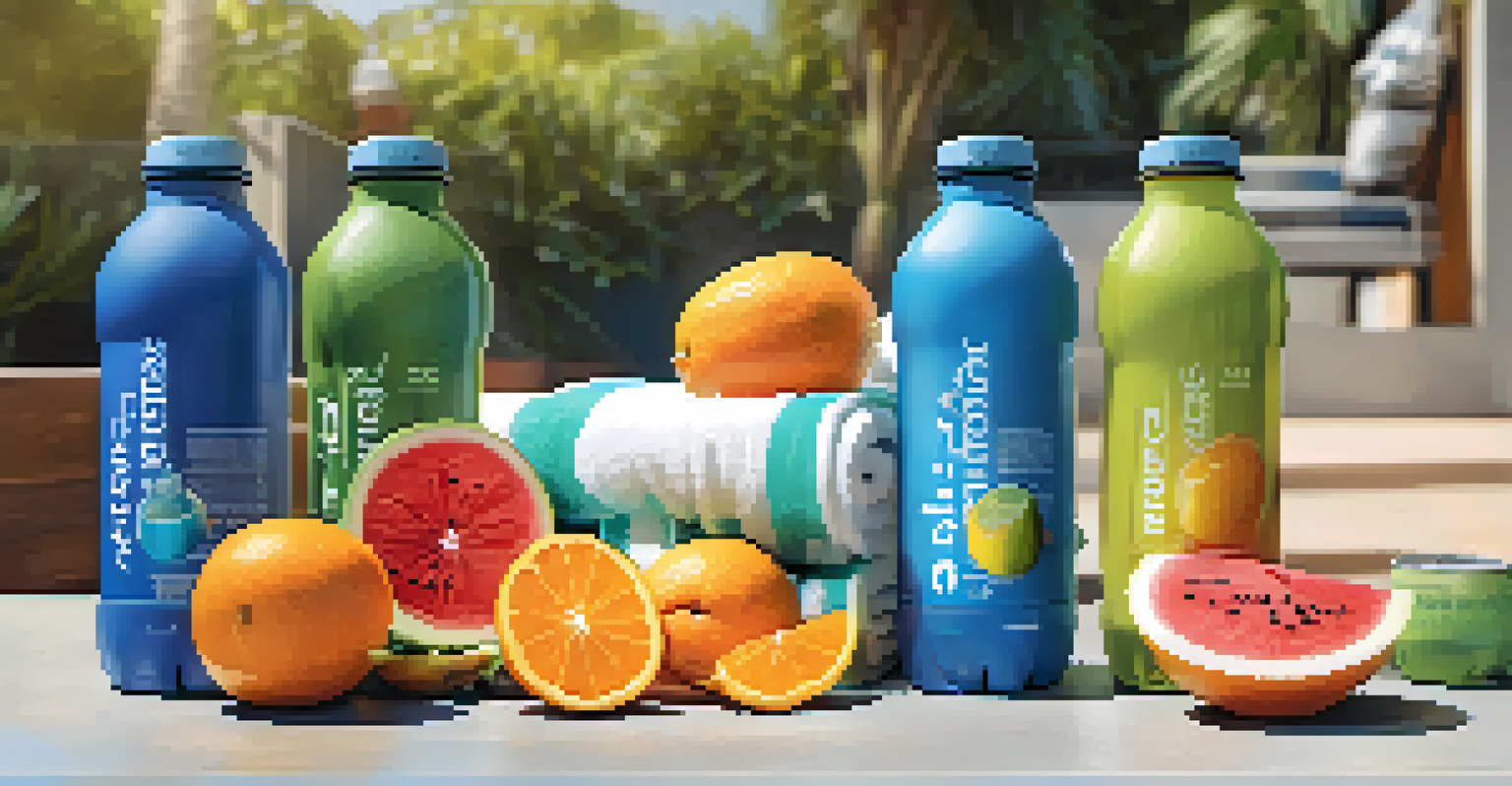Nutrition Tips for Older Adults Engaging in Powerlifting

Understanding the Unique Nutritional Needs of Older Lifters
As we age, our bodies undergo various changes that can impact our nutritional needs. Older adults engaging in powerlifting require a balanced diet that supports muscle maintenance and recovery. This means focusing on adequate protein intake, healthy fats, and complex carbohydrates to fuel workouts and promote overall health.
The greatest wealth is health.
It's essential to understand that muscle mass naturally declines with age, making it crucial to consume enough protein to combat this loss. Aim for high-quality protein sources like lean meats, fish, dairy, and plant-based options such as legumes and nuts. Incorporating protein in each meal can help sustain muscle strength and support recovery.
Additionally, older adults should not overlook the importance of hydration. Dehydration can lead to fatigue and hinder performance. Drinking plenty of water throughout the day, especially during and after workouts, is key to maintaining energy levels and aiding in muscle recovery.
The Role of Protein in Supporting Muscle Health
Protein is often referred to as the building block of muscles, and for good reason. For older adults involved in powerlifting, consuming sufficient protein is vital for muscle repair and growth. Studies suggest that older individuals may benefit from higher protein intake compared to younger adults to preserve muscle mass.

Aiming for around 1.2 to 2.0 grams of protein per kilogram of body weight daily can be beneficial. This can be achieved by incorporating protein-rich foods into regular meals and snacks. For instance, including eggs in breakfast, chicken in lunch salads, and Greek yogurt as a post-workout snack can easily boost daily intake.
Protein is Key for Muscle Health
Older adults should prioritize protein intake to support muscle maintenance and recovery in powerlifting.
It's also worth noting that spreading protein intake throughout the day can maximize muscle protein synthesis. Rather than loading up on protein in one meal, try to include it in every meal or snack for optimal results.
Incorporating Healthy Fats for Energy and Recovery
Healthy fats play a crucial role in an older adult's diet, especially for those engaging in powerlifting. They provide a concentrated source of energy, which is vital for intense training sessions. Moreover, healthy fats contribute to hormone production and can aid in the absorption of fat-soluble vitamins.
Nutrition is an essential part of maintaining good health and can help you reach and maintain a healthy weight.
Sources of healthy fats include avocados, nuts, seeds, and olive oil. Incorporating these foods into meals can enhance flavor and nutritional value. For example, drizzling olive oil over vegetables or enjoying a handful of nuts as a snack can easily boost fat intake.
It's important to balance fat consumption with overall caloric needs. While healthy fats are beneficial, they are also calorie-dense, so moderation is key to avoid unwanted weight gain.
The Importance of Carbohydrates for Fueling Workouts
Carbohydrates are often misunderstood, but they are essential for fueling workouts, especially in powerlifting. They provide the energy needed for high-intensity training, helping to enhance performance and endurance. For older adults, focusing on complex carbohydrates can ensure sustained energy levels throughout the workout.
Whole grains, fruits, and vegetables are excellent sources of complex carbs that offer additional nutrients and fiber. For instance, opting for brown rice instead of white rice or choosing whole-grain bread can make a significant difference. These foods not only provide energy but also support digestive health.
Healthy Fats Fuel Workouts
Incorporating healthy fats into the diet provides essential energy and aids in hormone production for older lifters.
Timing carbohydrate intake around workouts can also be beneficial. Consuming a carbohydrate-rich snack before training can help boost energy levels, while post-workout carbs can aid in recovery by replenishing glycogen stores.
Micronutrients: Essential Vitamins and Minerals for Lifters
Micronutrients, including vitamins and minerals, play a significant role in overall health and athletic performance. For older adults involved in powerlifting, certain micronutrients are particularly important for muscle function, bone health, and recovery. Key players include calcium, vitamin D, magnesium, and potassium.
Calcium and vitamin D are crucial for maintaining bone density, which can decrease with age. Good sources of calcium include dairy products, leafy greens, and fortified foods. Meanwhile, getting adequate sunlight and incorporating foods like fatty fish can help boost vitamin D levels.
Magnesium and potassium are vital for muscle function and recovery. Foods rich in these minerals, such as bananas, nuts, and leafy greens, should be included in daily meals to support overall performance and health.
Hydration Strategies for Optimal Performance and Recovery
Staying hydrated is essential for everyone, but it becomes increasingly important as we age. For older adults engaging in powerlifting, proper hydration can enhance performance, improve recovery, and prevent fatigue. It's recommended to drink water regularly throughout the day, not just during workouts.
A good rule of thumb is to aim for at least 8 cups (64 ounces) of water daily, but this may need to be adjusted based on activity level and individual needs. Adding electrolyte-rich beverages after intense workouts can also help replenish lost minerals and maintain hydration.
Carbs Enhance Performance and Recovery
Complex carbohydrates are crucial for fueling workouts and aiding recovery, making them an essential part of an older lifter's diet.
To make hydration easier, consider carrying a refillable water bottle and setting reminders to drink. Incorporating hydrating foods like watermelon, cucumbers, and oranges can also contribute to overall fluid intake.
Meal Timing: Optimizing Nutrition Around Workouts
Meal timing can significantly impact performance and recovery for older adults engaging in powerlifting. Planning when to eat can help ensure that your body has the necessary fuel before workouts and the right nutrients for recovery afterward. A well-timed meal can enhance energy levels and support optimal performance.
Ideally, aim to eat a balanced meal containing protein and carbohydrates about 2-3 hours before training. This allows sufficient time for digestion and energy release. For those with less time, a light snack closer to workout time can also provide a quick boost.

Post-workout nutrition is equally important. Consuming a meal or snack rich in protein and carbohydrates within 30-60 minutes after training can aid in muscle recovery and replenish glycogen stores, setting you up for success in your next workout.